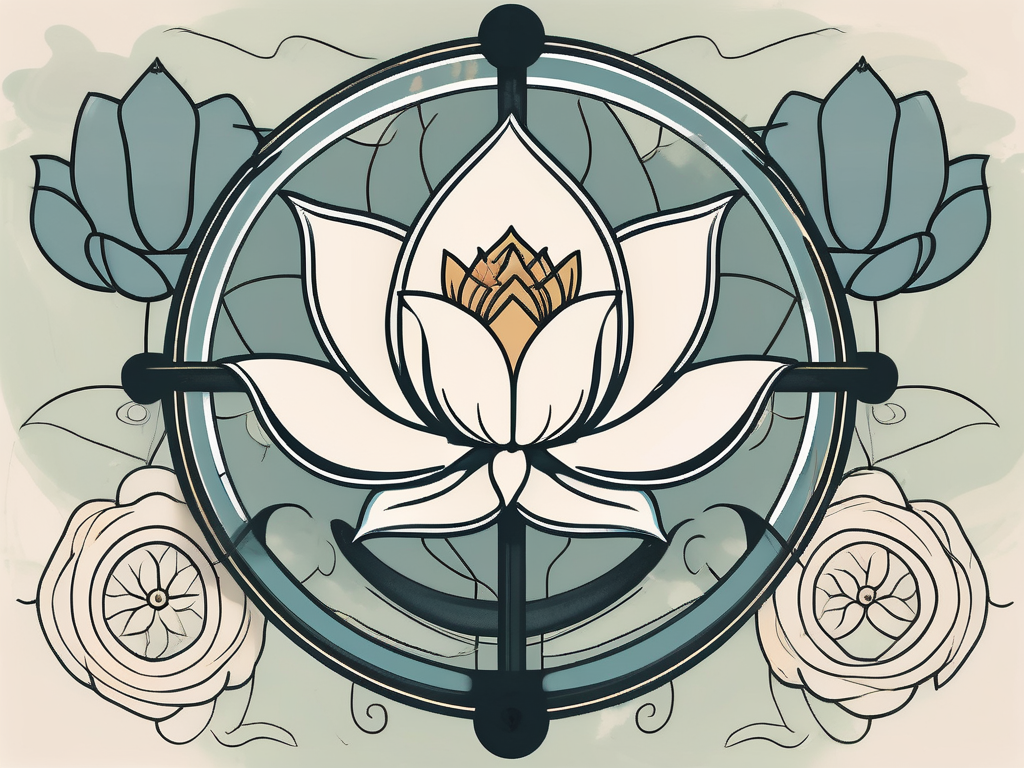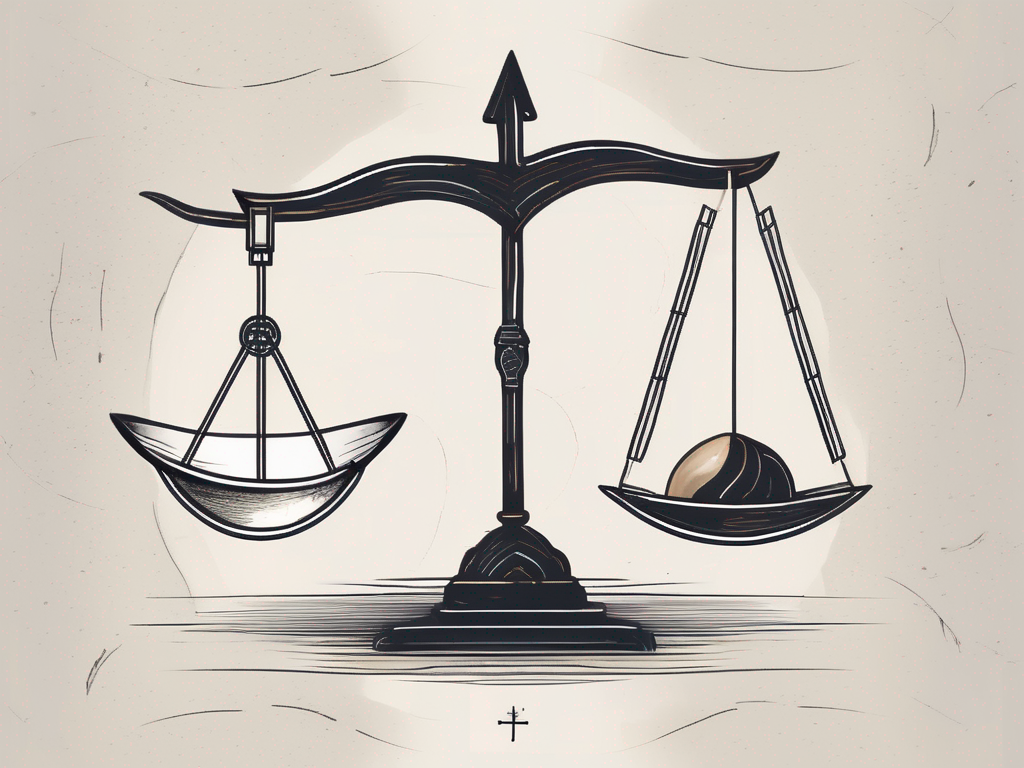Karma is a fundamental concept in Buddhism that plays a crucial role in shaping our lives and determining our destinies. In this article, we will delve deep into the concept of karma and explore its different types, its influence on our lives and afterlife, as well as debunk some misconceptions surrounding it.
Understanding the Concept of Karma
Before we dive into the intricacies of karma, it’s essential to grasp its origin and meaning. In Buddhism, karma is derived from the Sanskrit word “kri,” which means action or deed. It refers to the cause and effect principle that governs all our actions, thoughts, and intentions.
Karma is not just a philosophical concept; it is deeply rooted in the belief in the cycle of birth and death, known as samsara. According to this belief, every individual is born and reborn based on their karma, accumulating both positive and negative actions from their past lives.
Imagine karma as a seed that we plant through our intentional actions. Just as a seed grows into a tree, our actions bear fruits that shape our present and future experiences. Therefore, it is crucial to be mindful of our actions and their consequences.
In Buddhism, karma is not seen as a divine judgment or punishment but rather as a natural law. It is the pivotal force that drives the cycle of birth, death, and rebirth. Understanding and practicing karma allows individuals to take responsibility for their actions and cultivate positive qualities.
Karma is often described as a moral law, guiding individuals towards virtuous behavior and ethical conduct. By making conscious choices that align with Buddhist principles, individuals not only create positive karma but also strengthen their spiritual path.
When it comes to karma, there are different types and levels. The concept of “good karma” refers to positive actions that lead to favorable outcomes, while “bad karma” refers to negative actions that result in unfavorable consequences. It is believed that the accumulation of good karma can lead to a better future life, while bad karma can lead to suffering and difficulties.
However, karma is not solely determined by our actions in this lifetime. It extends beyond our current existence and encompasses the actions of our past lives as well. This understanding emphasizes the interconnectedness of all beings and the importance of cultivating compassion and empathy.
Practicing karma involves not only being mindful of our actions but also our thoughts and intentions. Buddhism teaches that our mental states and motivations play a significant role in shaping our karma. By cultivating positive qualities such as generosity, kindness, and wisdom, individuals can create a foundation for positive karma.
It is important to note that karma is not a deterministic concept. While our past actions influence our present circumstances, Buddhism also emphasizes the power of personal agency and the ability to change our karma through conscious effort and self-transformation.
In conclusion, karma is a fundamental concept in Buddhism that emphasizes the cause and effect principle governing our actions, thoughts, and intentions. It is rooted in the belief in the cycle of birth and death and serves as a moral law guiding individuals towards virtuous behavior and ethical conduct. By understanding and practicing karma, individuals can take responsibility for their actions, cultivate positive qualities, and shape their present and future experiences.
The Different Types of Karma in Buddhism
Within Buddhism, karma is categorized into three distinct types that encompass the entirety of our actions and their consequences: sanchita karma, prarabdha karma, and kriyamana karma.
Sanchita Karma: The Accumulated Result
Sanchita karma refers to the accumulated result of actions from past lives. It is the sum total of both positive and negative karma that shapes our present circumstances. The effects of sanchita karma may manifest in various aspects of our lives, including relationships, health, and wealth.
Understanding sanchita karma encourages individuals to reflect on their past actions and learn from them. By acknowledging the consequences of our previous deeds, we can make conscious efforts to improve our future karma.
For example, imagine a person who has experienced a series of failed relationships. Through the lens of sanchita karma, they may come to realize that their past actions, such as dishonesty or lack of commitment, have contributed to their current difficulties. This understanding can serve as a catalyst for personal growth and the cultivation of healthier relationship habits.
Moreover, sanchita karma extends beyond individual lives. It is believed that the collective karma of a community or society can influence the circumstances and opportunities available to its members. By recognizing this interconnectedness, individuals can strive to create positive change not only in their own lives but also in the lives of those around them.
Prarabdha Karma: The Fruit of Karma
Prarabdha karma is the portion of sanchita karma that is destined to be experienced in this present life. It is the karmic inheritance that we are born with and cannot escape. Prarabdha karma determines the lessons we need to learn and the challenges we must face in this lifetime.
Embracing prarabdha karma entails accepting the situations and experiences that come our way, both pleasant and unpleasant. It encourages individuals to approach them as opportunities for growth and self-reflection.
For instance, imagine a person who faces constant financial struggles despite their best efforts. Through the lens of prarabdha karma, they may come to understand that their current financial difficulties are part of their karmic journey. This realization can help them develop resilience, adaptability, and a deeper appreciation for the value of non-material aspects of life.
Furthermore, prarabdha karma teaches us the importance of compassion and empathy. By recognizing that everyone is navigating their own karmic path, we can cultivate understanding and support for others, even in the face of their challenges.
Kriyamana Karma: The Current Actions
Kriyamana karma is the karma that we create in the present moment through our thoughts, words, and deeds. It is the only aspect of karma that we have direct control over. By being mindful of our intentions and actions, we can shape our future karma and strive for positive outcomes.
Kriyamana karma underscores the importance of living in alignment with our values and cultivating virtuous qualities. It reminds us of the power we hold to transform our lives and create a positive impact on those around us.
For example, imagine a person who consistently practices acts of kindness and generosity. Through the lens of kriyamana karma, they may experience an increased sense of fulfillment and joy in their daily life. Their positive actions not only benefit others but also contribute to the cultivation of positive karma for themselves.
Moreover, kriyamana karma emphasizes the interconnectedness of our actions and their consequences. Every choice we make, no matter how small, has the potential to ripple through our lives and the lives of others. By cultivating mindfulness and making conscious choices, we can align our actions with our highest values and create a ripple effect of positivity.
In conclusion, the understanding of the different types of karma in Buddhism provides a framework for individuals to reflect on their past actions, embrace their present circumstances, and shape their future through mindful choices. By recognizing the intricate web of cause and effect, we can navigate our karmic journey with wisdom, compassion, and the intention to create a more harmonious and fulfilling life.
The Law of Karma
The law of karma is an integral part of the Buddhist worldview. It encompasses the principle of cause and effect and explains the intricate relationship between our actions and their consequences.
But what exactly is karma? Karma, derived from the Sanskrit word meaning “action” or “deed,” refers to the moral law of cause and effect. It is the belief that our actions, whether good or bad, have consequences that will ultimately shape our present and future experiences.
According to the law of karma, every action we undertake has a corresponding effect. Just as a pebble thrown into a pond creates ripples, our actions create energy that reverberates throughout the universe.
This principle applies to both positive and negative actions. Engaging in kind acts, practicing generosity, and cultivating compassion generate positive karma, which brings about happiness and well-being. Conversely, harmful actions, such as aggression or dishonesty, create negative karma that leads to suffering and discord.
It is important to note that karma is not a form of punishment or reward imposed by an external force. Instead, it is a natural consequence of our own volitional actions. In other words, we are the architects of our own destiny.
The Cycle of Birth and Death
In Buddhism, the law of karma is closely intertwined with the concept of samsara, the cycle of birth and death. It is believed that our actions in each life shape our future rebirths, perpetuating the cycle of suffering.
Imagine a wheel turning endlessly, with each revolution representing a new life. This is the cycle of samsara. According to Buddhist teachings, we are born, live, die, and are reborn again in an unending cycle of existence.
Breaking free from this cycle requires individuals to cultivate wholesome actions and purify their karma. By leading a virtuous life and seeking enlightenment, one can transcend the cycle of birth and death, achieving liberation and ultimate bliss.
It is through the understanding and practice of the law of karma that Buddhists strive to break free from the cycle of suffering. By taking responsibility for their actions and making conscious choices, they aim to create positive karma that will lead to a more enlightened and fulfilling existence.
Ultimately, the law of karma serves as a guiding principle for Buddhists, reminding them of the interconnectedness of all beings and the importance of cultivating kindness, compassion, and wisdom in their daily lives.
Misconceptions about Karma
There are several misconceptions surrounding karma that need to be clarified to grasp its true essence.
Before delving into these misconceptions, it is important to understand the fundamental concept of karma. Derived from the Sanskrit word meaning “action” or “deed,” karma refers to the universal law of cause and effect. It is the belief that every action we take, whether physical, verbal, or mental, has consequences that will manifest in our lives.
Karma is Not Punishment
Karma should not be seen as a form of punishment or divine retribution. Rather, it is a natural law that governs the consequences of our actions. The aim of karma is not to pass judgment but to provide individuals with an opportunity to learn, grow, and transform themselves.
When we understand that karma is not about punishment, we can shift our perspective and see it as a compassionate teacher. It offers us valuable lessons and insights into our own behavior, allowing us to make amends, develop empathy, and cultivate positive qualities.
Karma is Not Fate
Karma should not be mistaken for destiny or predestination. While our past actions shape our present circumstances, we hold the power to change our future through conscious choices. By exerting effort and making mindful decisions, we can reshape our karma and create a better future for ourselves.
Understanding that karma is not fixed or predetermined empowers us to take responsibility for our actions and make positive changes in our lives. It reminds us that we are not bound by the past and that we have the ability to create a brighter and more fulfilling future.
Karma and Intention
Another misconception about karma is that only the outcome of our actions matters. However, karma is not solely determined by the result but also by the intention behind our actions. It is the motivation and mindset with which we engage in an action that influences the karmic consequences.
For example, if someone donates money to a charitable cause with the intention of gaining recognition rather than genuinely helping others, the karmic outcome may be different compared to someone who donates selflessly. The intention behind our actions shapes the energy we put into the world and influences the ripple effects of karma.
Karma and Interconnectedness
One of the profound aspects of karma is its recognition of the interconnectedness of all beings. Our actions not only affect ourselves but also impact the collective consciousness of humanity and the world at large. Every thought, word, and action contributes to the collective karmic energy.
Understanding this interconnectedness can inspire us to cultivate kindness, compassion, and mindfulness in our interactions with others. By doing so, we contribute to the creation of a more harmonious and compassionate world.
In conclusion, karma is a complex and multifaceted concept that goes beyond the simplistic notions of punishment or fate. It is a profound teaching that invites us to take responsibility for our actions, cultivate positive intentions, and recognize our interconnectedness with all beings. By understanding these misconceptions and embracing the true essence of karma, we can embark on a transformative journey of personal growth and spiritual development.
How Karma Influences Life and Afterlife
Karma plays a significant role not only in our present lives but also in the afterlife and the process of reincarnation.
Karma and Reincarnation
According to Buddhism, when an individual dies, their consciousness continues to exist and migrates to a new body. The circumstances and experiences of their next life are determined by their karma accumulated from past lives.
Karma acts as the guiding force that determines the quality of one’s rebirth. Positive karma leads to a higher realm, such as being born into a privileged family or attaining a human birth, while negative karma may result in a lower realm, such as being reborn as an animal or experiencing immense suffering.
Karma and Enlightenment
In Buddhism, the ultimate goal is to attain enlightenment and liberation from the cycle of birth and death. To achieve this, individuals must purify their karma through virtuous actions, meditation, and the cultivation of wisdom.
By transcending the grasp of karma, enlightened beings break free from the karmic cycle and attain nirvana – a state of complete liberation and cessation of suffering.
In conclusion, karma is a complex and multidimensional concept in Buddhism, encompassing the entirety of our actions, intentions, and their consequences. Understanding karma allows individuals to take responsibility for their lives, make conscious choices, and strive for personal growth. By embracing the law of karma, we can navigate the cycle of birth and death with wisdom and compassion, ultimately realizing our true potential and attaining enlightenment.












